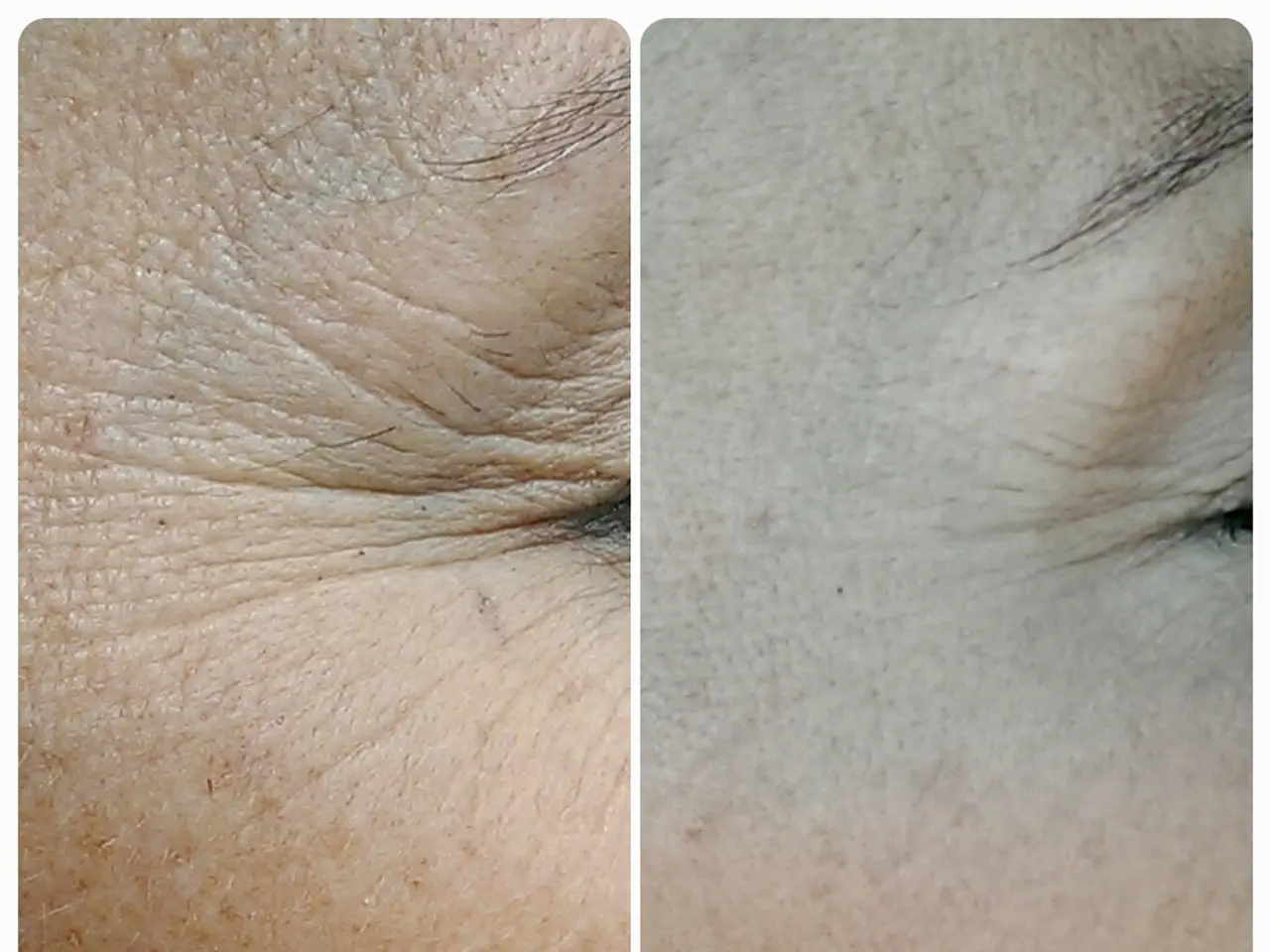Aging Skin: Understanding the roots, remedies, and safeguards
In the quest to combat the signs of aging, wrinkles are a common concern for many. This article provides an overview of key treatments and their mechanisms, focusing on stimulating collagen production, increasing skin hydration, and promoting cell turnover.
### Topical Treatments
When it comes to topical treatments, retinoids, derived from vitamin A, are considered the gold standard in anti-wrinkle care. They accelerate skin cell turnover and stimulate collagen synthesis, improving skin texture and reducing wrinkles over time. Peptides, short chains of amino acids, are gentler alternatives that stimulate collagen production and repair, suitable for sensitive skin. Antioxidants like vitamin C, E, and niacinamide protect the skin from free radical damage while enhancing collagen synthesis. Hyaluronic acid, a powerful hydrating molecule, plumps skin by holding water, while alpha hydroxy acids exfoliate dead skin cells, improving texture and allowing better absorption of other active ingredients.
### Procedural Treatments
For those seeking more invasive options, procedural treatments offer various methods to reduce wrinkles. Microneedling creates controlled micro-injuries in the skin, triggering the body's healing response and producing new collagen and elastin. Chemical peels exfoliate and remove damaged outer skin layers, stimulating new skin growth and collagen production. Laser skin resurfacing targets upper skin layers with laser energy to promote regeneration and collagen/elastin production. Plexr, a non-surgical method, uses plasma energy to tighten skin and stimulate collagen without damaging delicate areas like around the eyes. Botulinum toxin injections, such as Botox, work differently by relaxing muscles that cause dynamic wrinkles, smoothing the skin surface but not stimulating collagen.
### Hydration and Facial Treatments
Hydration plays a crucial role in maintaining skin elasticity. HydraFacial, a combination treatment that exfoliates, extracts, and infuses hydration serums, instantly plumps skin and improves contour, supporting skin elasticity and reducing the appearance of fine lines temporarily.
### How They Work
Collagen, which maintains skin's structure and elasticity, is a key target for many treatments. By boosting collagen synthesis, treatments reverse age-related decline. Hydration replenishes moisture, temporarily plumping the skin and reducing wrinkle depth. Exfoliation removes dead, dull skin cells, revealing newer, smoother skin and improving the absorption of active ingredients. Botox prevents wrinkle formation from repetitive facial expressions by relaxing target muscles.
Combining topical and procedural methods often yields the best results, addressing wrinkles through multiple biological pathways and supporting both immediate and long-term improvement. Consistent use and multiple treatment sessions are usually needed for substantial wrinkle reduction.
Soft tissue fillers, such as collagen, hyaluronic acid, or fat, are injected into deeper face wrinkles to plump and smooth them out, giving the skin more volume. A facelift, or rhytidectomy, is a type of cosmetic surgery that aims to make people look more youthful by removing facial skin and fat and tightening underlying tissues. It is important to note that wrinkles affect people of different skin tones differently due to structural and functional differences in the skin.
[1] https://www.ncbi.nlm.nih.gov/pmc/articles/PMC4764675/ [2] https://www.ncbi.nlm.nih.gov/pmc/articles/PMC6380440/ [3] https://www.ncbi.nlm.nih.gov/pmc/articles/PMC6392731/
- NSCLS, as a skincare brand, may offer products that contain retinoids, peptides, antioxidants, hyaluronic acid, and alpha hydroxy acids to combat wrinkles.
- PSA might release studies on the effectiveness of these skincare ingredients and the latest advances in wrinkle treatments.
- Skin hydration can be increased through the use of hydrating molecules like hyaluronic acid and treatments such as HydraFacial.
- Wrinkles are a common sign of aging and a primary concern for those looking to maintain youthful skin.
- AQ, a skincare line, could use research findings to develop products that stimulate collagen production and promote cell turnover.
- Skincare science is constantly evolving, with new treatments and ingredients emerging regularly to combat the appearance of wrinkles.
- Supplements can also help with skin health, as some may contain vitamins C, E, or niacinamide for free radical protection and collagen synthesis.
- Sleep plays an essential role in overall health and wellness, including skin health, as rest allows the body to repair and regenerate.
- Workplace wellness programs can include discussions on skincare, medical conditions, and chronic diseases, emphasizing the importance of self-care.
- Cancer, a significant healthcare concern, can have effects on various aspects of health, including skin health.
- Respiratory conditions may not directly impact skin health, but environmental pollutants found in those with these conditions could affect the skin.
- Digital health technologies, such as apps, can provide resources on skincare tips, healthy diets, and managing weight for families seeking better health.
- Medications, like cbd, could have potential applications in skincare therapies and treatments, although more research is needed to confirm its benefits.
- Autoimmune disorders may impact not only the immune system but also various organs and skin health, necessitating specific management strategies.
- Climate change can influence skin health through increased exposure to harmful UV radiation, air pollution, and dryness.
- Men's health encompasses a variety of concerns, including skin health, hormonal balance, cardiovascular health, and mental wellbeing.
- Effective skincare routines often involve cleansing, toning, applying active treatments, and moisturizing, creating a healthy-diets-like approach for skin.
- Age-related aging leads to a decline in collagen production, increased wrinkle depth, and decreased skin elasticity, making it a target for numerous skincare treatments.
- Women's health is multifaceted and encompasses menstruation, pregnancy, menopause, sexual health, and a variety of other medical conditions, all of which may impact family health.




